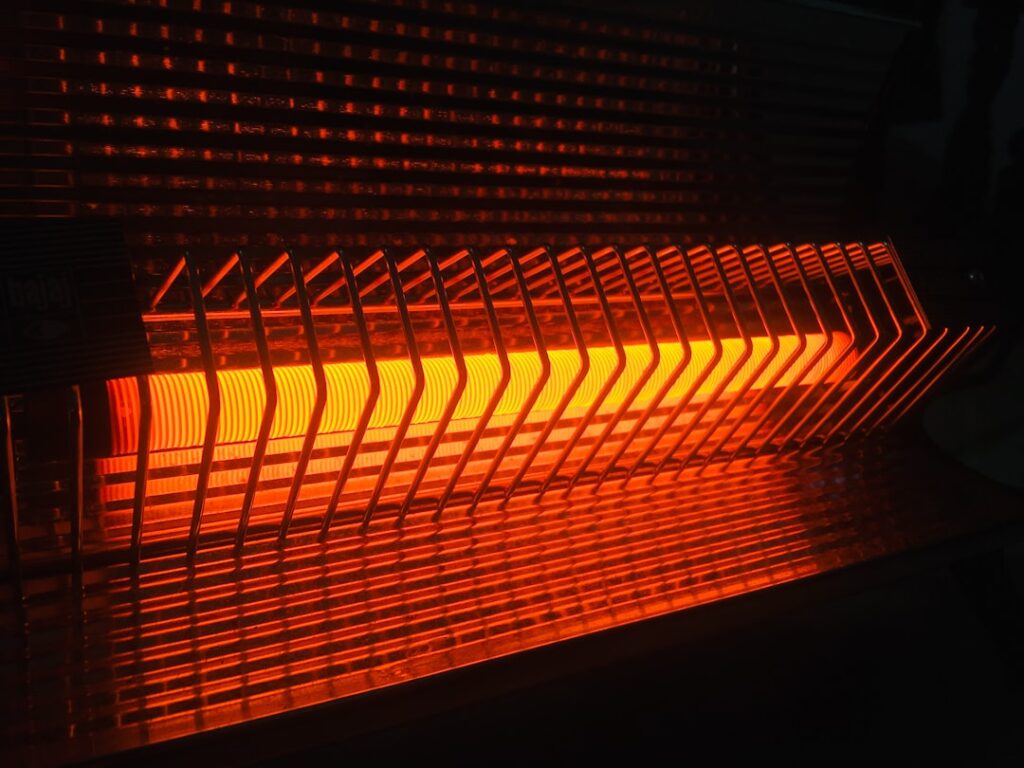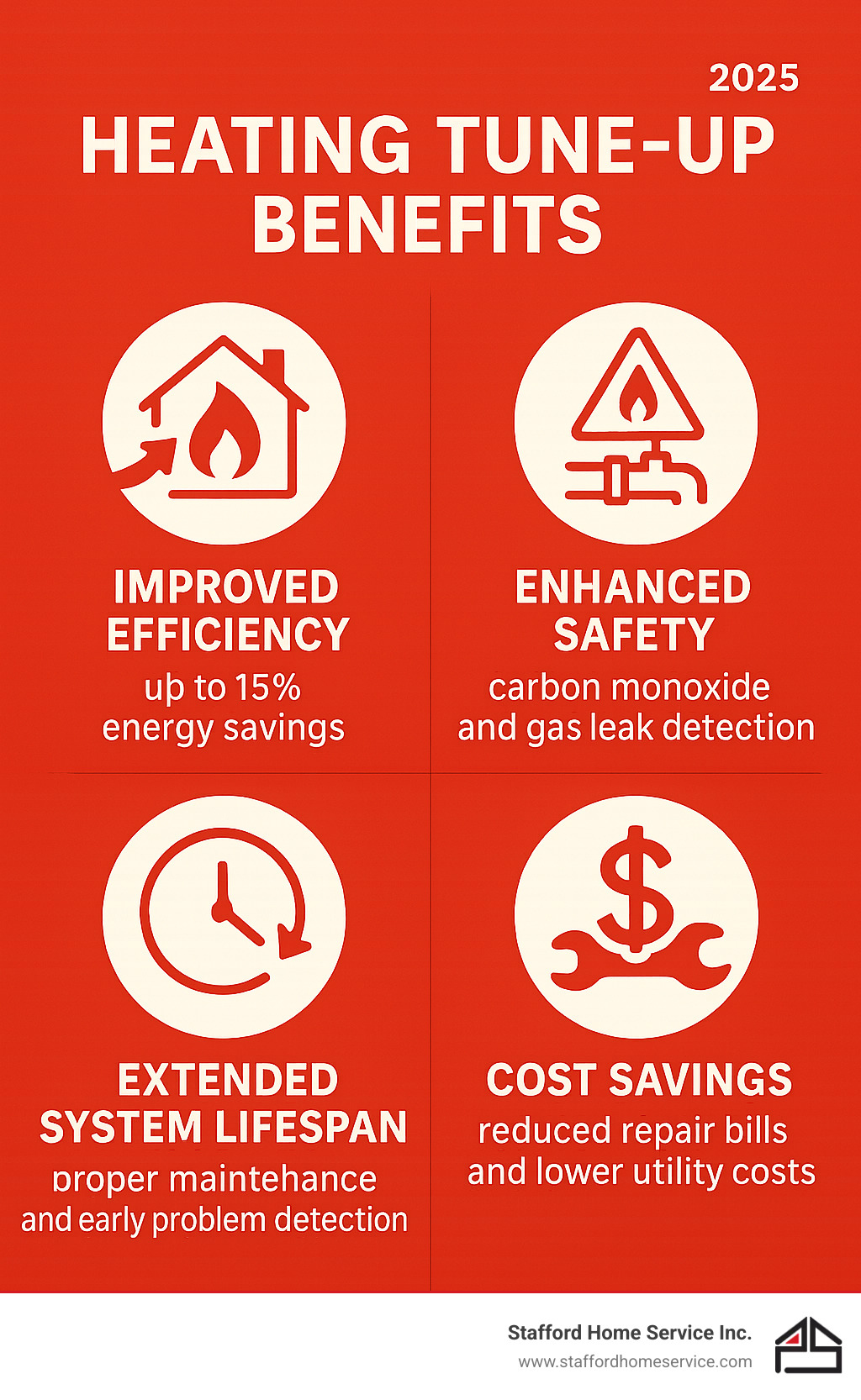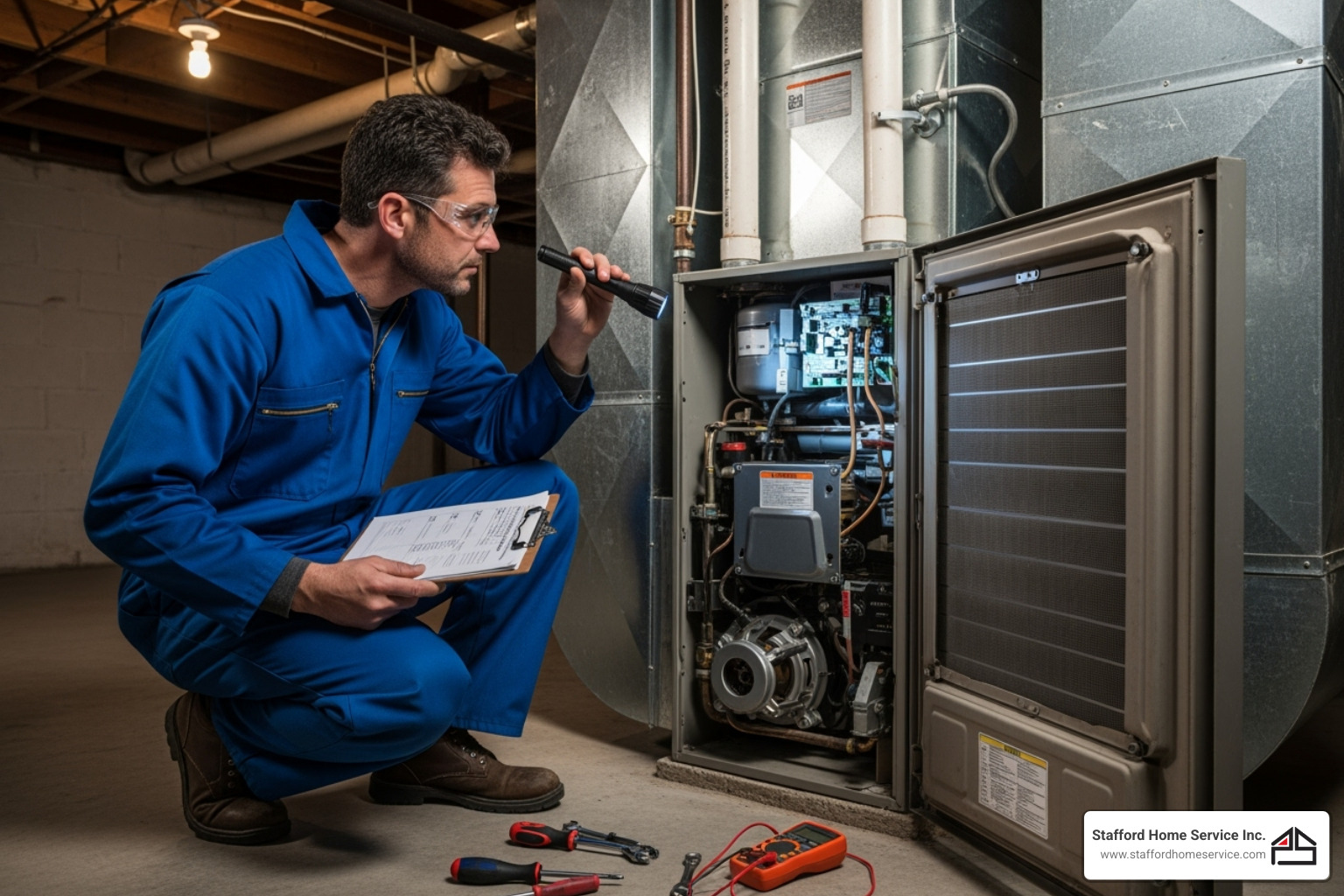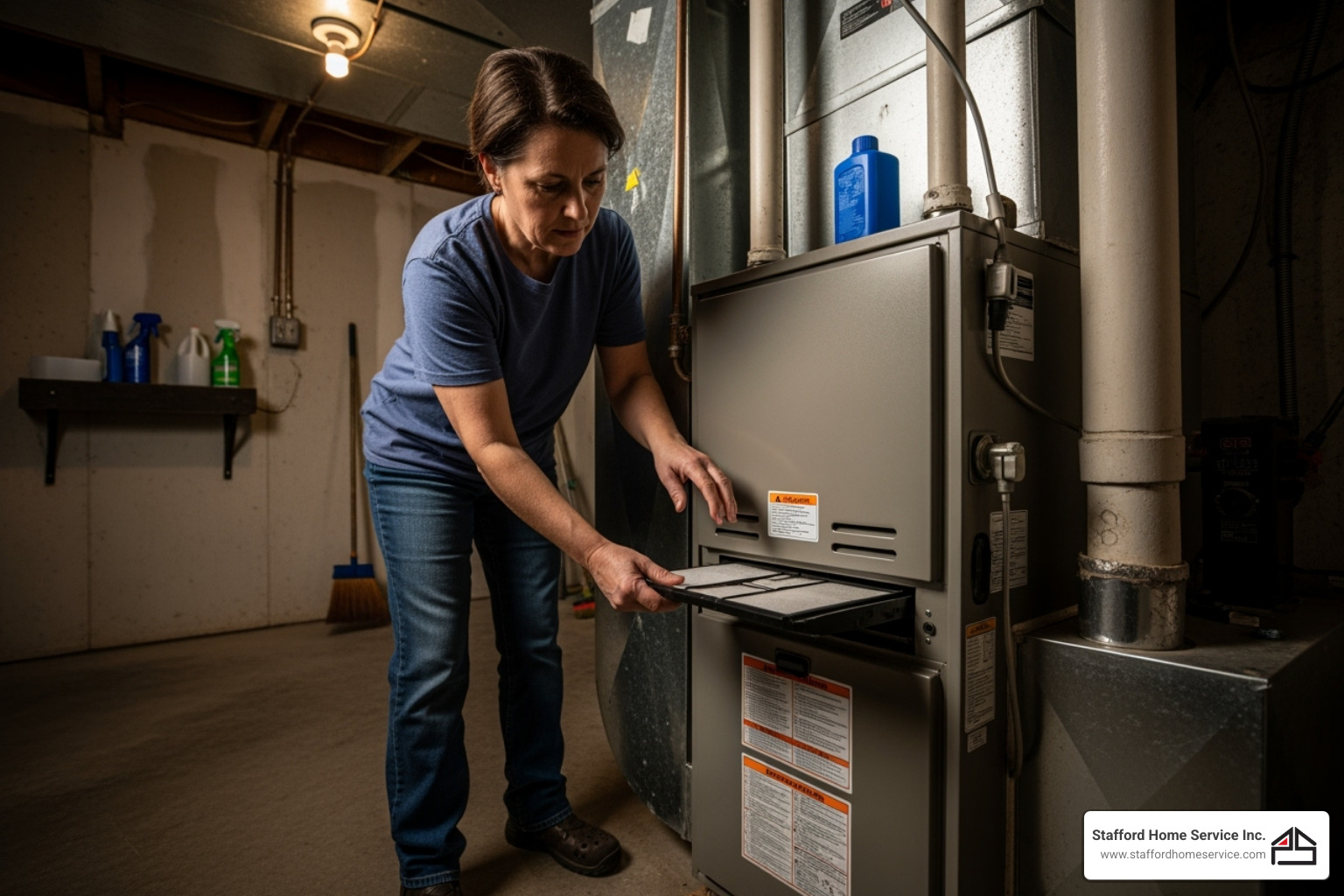Why Regular Heating System Maintenance Protects Your Home and Wallet
A heating tune up is preventative maintenance performed by a professional HVAC technician to inspect, clean, and optimize your furnace or heating system for safe, efficient operation. Here’s what you need to know:
What’s Included:
- Comprehensive inspection of all heating components
- Cleaning of burners, blower, and heat exchanger
- Safety checks for gas leaks and carbon monoxide
- Thermostat calibration and performance testing
- Filter replacement and airflow assessment
Key Benefits:
- Improved efficiency – up to 15% energy savings
- Extended lifespan – proper maintenance prevents premature failure
- Improved safety – prevents dangerous gas leaks and CO exposure
- Fewer breakdowns – catches problems before they become costly repairs
Picture this scenario from one homeowner: “Your home is becoming too cool for comfort this fall, so you decide to turn on your heating system. However, your system either will not produce warm air or is not functioning efficiently.” This uncomfortable situation is exactly what regular maintenance prevents.
When to Schedule: Annual tune-ups are recommended, ideally in early fall before you need your heating system. Most tune-ups take 1-2 hours to complete.
The reality is simple – regular furnace maintenance can prevent unexpected breakdowns, save money on energy bills, and ensure your family stays warm all winter long. Just like changing your car’s oil, a heating tune up is essential preventative care that protects your investment.
What is a Heating Tune-Up and Why is it Crucial?
Think of a heating tune up as a wellness check for your home’s heating system. Just like annual doctor visits catch health issues early, your furnace needs preventative care to keep your family comfortable all winter long.
During a professional inspection, our experienced technicians conduct a comprehensive evaluation of your heating system, from the heat exchanger to the smallest electrical connection. This detailed approach helps us spot potential problems while they’re still small and manageable. By cleaning your system and ensuring everything runs smoothly, we actively maintain system efficiency and protect your home safety. A well-maintained furnace heats more safely and reliably, giving you peace of mind.
Furnace longevity is another crucial benefit. Regular tune-ups can add years to your system’s life, maximizing your investment. For comprehensive information about how our services support system longevity, visit our heating services for system longevity page. When your heating system receives consistent professional attention, reliability becomes something you can count on.
The Top Benefits of Regular Furnace Maintenance
Regular furnace maintenance delivers benefits that touch every aspect of your home comfort and budget.
- Energy efficiency is the most immediate reward. A clean, well-tuned furnace doesn’t have to work as hard, which directly translates to lower utility bills.
- An extended lifespan is the long-term value. Regular care for moving parts and electrical components prevents the neglect that leads to premature system failure.
- You’ll experience fewer breakdowns and emergency service calls. Our tune-ups catch small issues before they become big, expensive problems that leave your family shivering.
- Improved safety is paramount, especially regarding carbon monoxide prevention. A cracked heat exchanger or improper ventilation can be deadly, and our safety checks ensure your system isn’t putting your family at risk.
- You’ll also enjoy improved indoor air quality from clean filters and components, plus consistent comfort without cold spots.
Protecting Your Investment: Tune-Ups and Manufacturer Warranties
Your furnace is a significant investment. Protecting it requires understanding warranty validation. Most manufacturers require proof of maintenance to honor warranty claims. Skipping annual tune-ups could mean you’ll pay for repairs that should have been covered.
This standard industry practice helps you in avoiding uncovered repairs. A major component failure, like a heat exchanger, can be costly if your warranty is voided due to a lack of maintenance records. Protecting new systems is also vital. The first annual tune-up on a new furnace verifies correct installation, establishes your maintenance history for the warranty, and ensures peak performance from day one.
If you’re wondering if your system is beyond maintenance, our guide on signs that you need a new heating system can help you decide.
The Professional Heating Tune Up Checklist: What to Expect
When you schedule a heating tune up with our team at Stafford Home Service Inc., our experienced technicians perform a comprehensive inspection. The process typically takes one to two hours, during which we’ll perform a meticulous cleaning process, conduct crucial safety checks, and run precise performance testing. Our goal is to leave your home with a furnace that runs as efficiently and safely as possible, giving you peace of mind when the temperatures drop.
Key Inspection and Cleaning Tasks
During your heating tune up, our technicians methodically work through every essential component. Key tasks include:
- Inspecting the heat exchanger: We carefully check for cracks, rust, or corrosion, as a damaged heat exchanger can leak dangerous carbon monoxide.
- Cleaning and adjusting burners: Dirty burners burn fuel inefficiently. We clean them and make precise adjustments to restore a proper blue flame for maximum efficiency.
- Cleaning the flame sensor: A dirty sensor can cause your furnace to shut down unexpectedly. We clean it to ensure it accurately detects the flame.
- Inspecting the blower motor and wheel: A dirty blower reduces efficiency and can cause noise. We inspect, clean, and lubricate the assembly for smooth operation and optimal airflow.
- Checking the flue and venting system: Proper ventilation is essential for safely expelling combustion byproducts. We check for blockages, leaks, or damage.
- Tightening electrical connections: Loose connections are a common cause of malfunctions and fire hazards. We inspect and tighten them as needed.
- Inspecting and cleaning the condensate line: For high-efficiency furnaces, we clear this line to prevent water leaks and system shutdowns.
We also verify gas pressure levels, check the igniter or pilot light for reliable startups, assess visible ductwork for leaks, and lubricate all moving parts to reduce friction and extend component life. For a more comprehensive understanding of professional heating maintenance standards, you can reference the in-depth list of heating maintenance tasks from the AC Contractors of America.
Safety and Performance Checks
Safety is the foundation of our heating tune up. We begin with thermostat calibration to ensure accuracy, preventing wasted energy. Our carbon monoxide testing is thorough and non-negotiable; we test in and around your furnace and verify your CO detectors are working. Gas leak detection is another critical step, where we use specialized equipment to examine all gas lines and connections.
We also test all of your furnace’s safety controls—the systems designed to shut everything down if something goes wrong. Our airflow assessment evaluates how well heated air moves through your system, which includes checking air filters and ductwork. Finally, we conduct performance testing, running your furnace through a normal cycle to monitor its overall efficiency and make any necessary adjustments.
The Energy Star maintenance checklist provides additional guidance on maintaining optimal heating system performance year-round.
Common Problems Prevented by a Professional Heating Tune Up
A regular heating tune up prevents common emergencies that happen at the worst times. Our service addresses the root causes of many issues:
- Furnace won’t turn on: Often caused by a dirty flame sensor, faulty pilot light, or loose electrical connection.
- Blowing cold air: Usually a dirty air filter, thermostat issue, or internal control problem.
- Water leaks: Typically from a clogged condensate line in high-efficiency furnaces.
- Strange noises: Squealing or grinding often points to blower motor or fan issues that need lubrication or cleaning.
- Cracked heat exchanger: This serious safety hazard, which can leak carbon monoxide, is something we look for in every inspection.
- Short-cycling: This wasteful on-and-off pattern is often caused by a dirty component or miscalibrated thermostat.
By investing in maintenance, you prevent these headaches and ensure your family stays warm. If you do encounter problems, our team is ready with professional Furnace Repair services.
Your Role in Furnace Maintenance: Scheduling, DIY, and Choosing a Pro
While we handle the technical aspects of your heating tune up, you play an important role in keeping your furnace running smoothly. This partnership of professional expertise and homeowner care ensures your home stays warm while protecting your investment. Simple tasks, smart scheduling, and choosing the right pro make all the difference.
The Best Time and Frequency for a Tune-Up
The golden rule: schedule your heating tune up once a year, preferably in early fall. September or October are ideal because you’ll catch any issues before winter arrives. Early fall scheduling means you beat the winter rush, get convenient appointment times, and avoid the stress of a cold house while waiting for service.
If you have a heat pump that handles both heating and cooling, schedule maintenance twice a year: in the spring for cooling and in the fall for heating. This dual approach keeps your system running efficiently year-round. For more guidance on seasonal maintenance, check out our Essential Seasonal HVAC Service Tips.
Simple DIY Maintenance Between Professional Visits
You don’t need to be an HVAC expert to help your furnace run better. These simple tasks make a big difference:
- Changing air filters is your most important job. Do it every 1-3 months (more often if you have pets or allergies). A dirty filter restricts airflow and forces your furnace to work harder.
- Clearing your furnace area is crucial for safety and access. Keep at least three feet of space around your furnace free from storage and flammable materials.
- Checking thermostat batteries annually can prevent a no-heat situation. Also, make sure your thermostat is set to “HEAT” mode before calling for service.
- Keeping vents unblocked by furniture, drapes, or rugs helps your furnace heat your home evenly and efficiently.
These small efforts add up to big benefits in efficiency and longevity. For more detailed maintenance guidance, visit our HVAC Maintenance Tips page.
How to Choose a Qualified HVAC Professional and How Long Does a Typical Heating Tune Up Take?
Choosing the right company for your heating tune up protects your investment. Look for these key qualities:
- Licensed and certified technicians: This is non-negotiable. Proper licensing ensures technicians can safely work with gas, electricity, and complex systems. Our team at Stafford Home Service Inc. consists of highly skilled professionals.
- Experience matters: An experienced company has seen every type of furnace problem and knows how to handle unexpected issues.
- Positive reviews and reputation: Check online reviews and ask for recommendations. A company with consistently satisfied customers demonstrates reliable service.
- Transparent pricing: Reputable companies explain costs clearly upfront, so there are no surprise bills.
- Service guarantees: A company that stands behind its work, like our Daikin Comfort Promise, shows confidence in its quality.
A typical heating tune up takes 1 to 2 hours, depending on your system’s condition. A thorough job is more important than a quick one. The cheapest option isn’t always the best value; quality workmanship from experienced technicians is what keeps your family safe and comfortable.
Frequently Asked Questions about Heating System Maintenance
We get a lot of questions from homeowners about heating system maintenance. Here are answers to the most common ones.
Do I really need a furnace tune-up every year?
Yes, absolutely! An annual heating tune up is essential preventative care. Your furnace works hard during Minnesota winters and needs professional attention to run reliably. The key reasons are:
- Efficiency: A well-maintained furnace can save you up to 15% on energy bills.
- Safety: We catch dangerous problems like gas leaks or carbon monoxide issues before they threaten your family.
- Longevity: Regular maintenance prevents small issues from becoming major failures, helping you avoid premature furnace replacement.
- Warranty Requirements: Most manufacturers require annual professional maintenance to keep your warranty valid.
Preventing costly repairs is always smarter and cheaper than dealing with an emergency breakdown. This same logic applies to boilers. Check out our Boiler Repair tips for more information.
I have a brand new furnace, do I still need a tune-up?
Yes, even a new furnace needs that first-year tune-up. It’s valuable for several reasons:
- Proper installation check: It lets us confirm everything is running exactly as it should after a few months of operation.
- Maintaining your warranty: Most warranties require annual maintenance starting from year one.
- Establishing good habits: Starting a routine right away ensures you never fall behind on care.
- Peak performance: Minor adjustments help your new furnace operate at maximum efficiency from the start.
Regular maintenance is the best insurance for your new investment. If you’re considering a new installation, learn more about our Heating Installation services.
What’s the difference between a tune-up and a repair?
The difference is straightforward:
- A heating tune up is preventative maintenance. We perform it when your system is working correctly to keep it that way. It involves cleaning, inspecting, and making small adjustments to prevent future problems.
- A repair is a reactive service. This happens when something has already broken or stopped working properly.
The goal of regular tune-ups is to dramatically reduce your need for unexpected and often costly repairs. By catching a worn part during routine maintenance, we can fix it before it fails and leaves you in the cold. Our expertise covers all heating systems, including Heat Pump Systems, for both maintenance and repairs.
Ensure Your Winter Comfort with Proactive Care
Imagine a frigid Minnesota morning where your family is cozy and warm inside. That peace of mind doesn’t happen by accident—it’s the result of smart, proactive care with a regular heating tune up. Investing in preventative maintenance protects your family’s comfort, safety, and budget. It’s the confidence of knowing your system is ready for winter.
At Stafford Home Service Inc., we’re committed to providing quality workmanship and complete customer satisfaction. Our experienced owners and technicians bring decades of knowledge to every job, backed by our Daikin Comfort Promise and flexible financing options.
Breakdowns always happen at the worst time. Don’t wait for a stressful emergency. Be proactive and enjoy reliable warmth all season long. We proudly serve homeowners throughout Minneapolis, Edina, Golden Valley, Minnetonka, Plymouth, St Louis Park, and across Minnesota.
Your family deserves a warm and worry-free winter. Schedule your heating repair and maintenance in Minneapolis today, and let us help you stay warm all season long.







